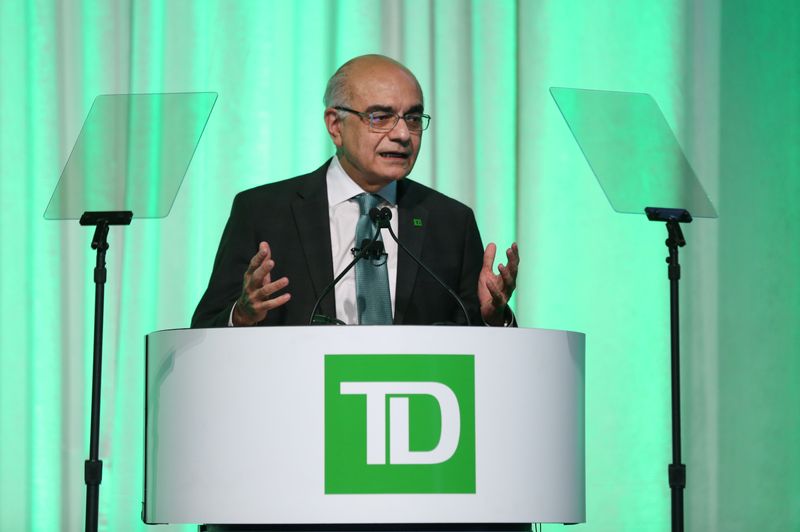By Nivedita Balu and Fergal Smith
TORONTO (Reuters) – Canada’s second-largest lender TD Bank’s efforts to resolve gaps in its anti-money laundering (AML) controls by the end of the year will likely clear the path for a new CEO, possibly an external candidate.
Ten shareholders interviewed by Reuters and two analysts said a CEO change is imminent next year, with a majority floating the idea of an external candidate with knowledge of the U.S. space who can start with a clean slate after TD resolves its AML issues with U.S. regulators.
Last week, TD announced it put aside a total of $3 billion to cover fines from U.S. regulators that have been probing weaknesses in the lender’s money laundering controls and hopes to find a global resolution of the civil and criminal investigations by the end of the calendar year. The penalties could lead to one of the biggest fines ever paid by a Canadian bank overseas.
TD CEO Bharat Masrani took the top job in November 2014 at a time the bank was in rapid expansion mode and focused on the U.S. market where it now has about 1,150 branches on the east coast, more branches than it has across Canada.
The probe by U.S. regulators including the Department of Justice, that came after the termination of its $13.4 billion deal to buy U.S.-based regional lender First Horizon (NYSE:FHN), extended Masrani’s stay at the top seat.
After the bank acknowledged the AML issues, shareholders said they preferred Masrani see the investigations through before handing over the baton to a new leader.
The departure of CEO contender Michael Rhodes left many with questions around CEO succession plan, raised at recent analyst calls and other events.
Ben Jang, a portfolio manager at Nicola Wealth, a TD shareholder, expects CEO change next year, potentially an outsider.
“Once we get past these rocky waters, and there is a little bit of light at the end of the tunnel, maybe that will help create more clarity for leadership change,” Jang said.
In response to a request for comment, TD said it has a robust succession planning process. “Our senior executive bench is strong.”
‘CULTURAL SHAKE-UP’
BofA Securities analyst Ebrahim Poonawala said investors’ desire for a “cultural shake-up” would likely require an external hire for the CEO role.
Canadian banks have in the past typically promoted internally, except Bank of Nova Scotia, which named board member Scott Thomson, former CEO of Caterpillar (NYSE:CAT) dealer Finning, as its chief last year.
While TD’s list of potential candidates is unclear, shareholders said a candidate with a deep understanding of Canadian banks, perhaps from the U.S., who could help steer TD’s growth plan south of the border, would be ideal.
Potential internal candidates include Leo Salom, who heads its U.S. retail business, Riaz Ahmed, the head of its capital market division, and Canada personal banking head Ray Chun, shareholders said.
At 68, Masrani is older than his predecessor, Ed Clark, when he retired, and the oldest CEO among Canada’s big six banks.
Once racing with Royal Bank of Canada for the most valued Canadian company in the 2000s, TD’s stock has gained 44% since Masrani took charge, compared to bigger rival RBC’s 95% gain during the same period.
TD last week said it would find a global resolution related to its anti-money laundering lapses. The provision of $2.6 billion in the fiscal third quarter resulted in the first loss TD recorded since 2003.
The resolution would also include non-monetary penalties, TD said.
If the penalty is something as severe as an asset cap, TD would be better off with an external candidate, said Anthony Visano, managing director at Kingwest & Co, a TD shareholder.
“As much as I don’t like the idea of an external candidate, potentially someone handcuffed in terms of strategy, they should come from outside the bank as the focus ought to be on capital returns, as capital deployment wouldn’t be an option in the U.S.”

